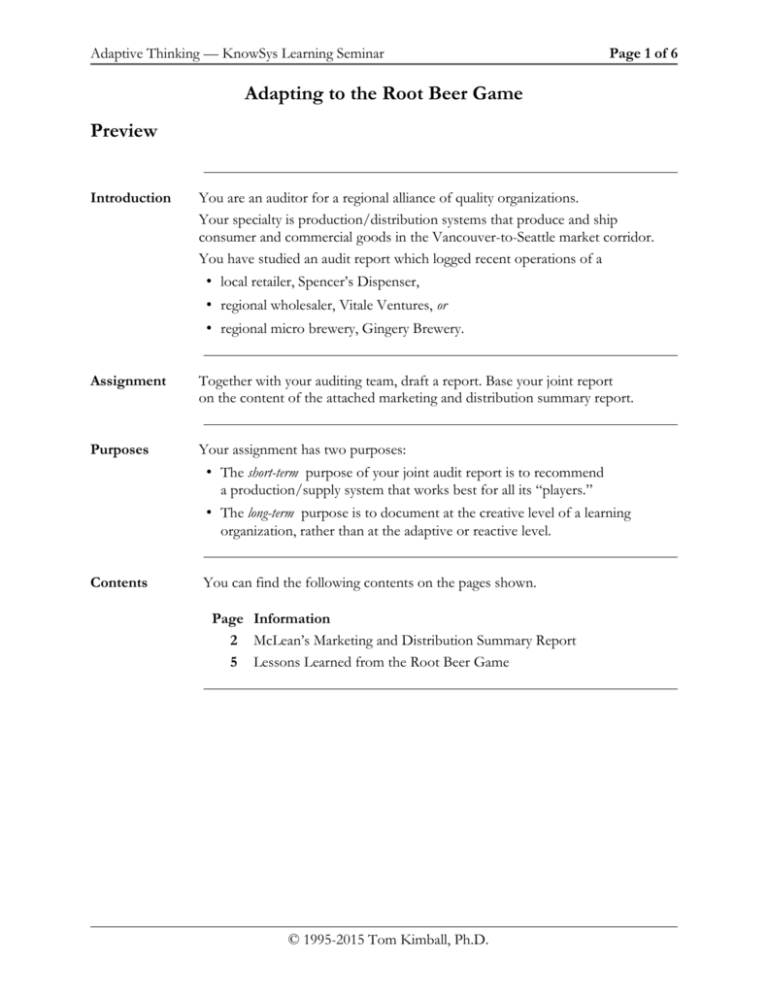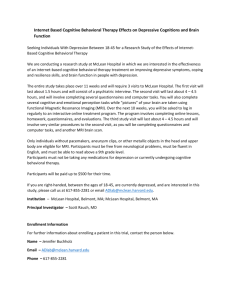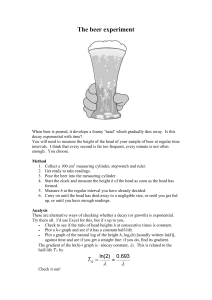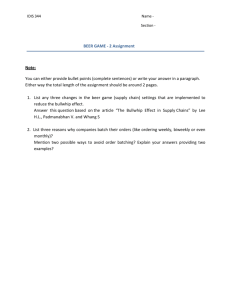Adapting to the Root Beer Game
advertisement

Adaptive Thinking — KnowSys Learning Seminar Page 1 of 6 Adapting to the Root Beer Game Preview Introduction You are an auditor for a regional alliance of quality organizations. Your specialty is production/distribution systems that produce and ship consumer and commercial goods in the Vancouver-to-Seattle market corridor. You have studied an audit report which logged recent operations of a • local retailer, Spencer’s Dispenser, • regional wholesaler, Vitale Ventures, or • regional micro brewery, Gingery Brewery. Assignment Together with your auditing team, draft a report. Base your joint report on the content of the attached marketing and distribution summary report. Purposes Your assignment has two purposes: • The short-term purpose of your joint audit report is to recommend a production/supply system that works best for all its “players.” • The long-term purpose is to document at the creative level of a learning organization, rather than at the adaptive or reactive level. Contents You can find the following contents on the pages shown. Page Information 2 McLean’s Marketing and Distribution Summary Report 5 Lessons Learned from the Root Beer Game © 1995-2015 Tom Kimball, Ph.D. Page 2 of 6 KnowSys Learning Seminar McLean’s Marketing and Distribution Summary Report Introduction This report involves the production/distribution system for Gingery Brewery and its wholesale-retail clients. It covers operations during the last quarter of last fiscal year and the first quarter of the current fiscal year. Source Don McLean, the marketing and distribution manager at Gingery Brewery, summarized this report. Input comes from personal observations and reactions of those in the customer-supplier network. Purpose The purpose of this report is to summarize and adapt systemic behavior patterns toward a “more successful” quality enterprise. Wholesaler input During the first week in March, Don McLean met face to face for the first time with Gino Vitale of Vitale Ventures. Gino showed Don his warehouse — wallto-wall Ninja Ginja pallets — 135 truckloads of root beer! He was chilly and glum: “I’m feeling jerked around like a puppet on a string!” Don commiserated with Gino. They both had seen the demand for Ninja Ginja rise rapidly, then drop off just as fast. Gino’s gestures said it more eloquently, but his words focused on the fickleness of teenage culture. Their joint conclusion: this root beer glut should never have happened! The retailers should have been more on the ball—and sent them a “heads up!” Retailer input Don McLean met with Rosa Spencer of Spencer’s Dispenser in early March, right after his icy visit with Gino Vitale. She admitted candidly that she had wanted to strangle him a few months earlier. Retreating over double tall lattes at her discount beverage outlet, Rosa and McLean scanned her tally sheets: “My back room is swimming in 90-odd cases of Ninja Ginja root beer. I can’t order any more for at least six weeks!” Distributor input Wait six weeks without orders! Don mentally calculated the consequences: retailers won’t scratch the shrink wrap on Vitale’s 135 cases of Ninja Ginja in the next 12 months, if every Rosa Spencer in the region waits six weeks before ordering any more Ninja Ginja — even if they all order a few cases per week after that! Don needed to keep another tragedy from happening. More… KnowSys website Adaptive Thinking — KnowSys Learning Seminar Page 3 of 6 More…McLean’s Marketing and Distribution Summary Report Retailer reaction Rosa Spencer stubbornly denied responsibility for the tragedy. She pointed out that her normal four cases went up to eight only when the music video came out. Despite McLean’s suggestion that demand had exploded, she calmly pointed to her steady sales of eight cases week after week after week. Rosa told McLean she had to keep ordering more Ninja Ginja because he and Vitale's didn’t send her what she wanted. Her customers needed satisfaction. Distributor reaction Don defended his marketing behavior to Rosa Spencer: “We got the root beer out as soon as it we could!” Spencer urged Don to promote Ninja Ginja with coupons or something: “I’d like to recoup my losses, and clear those 90-odd cases from the back room!” Don listened to Spencer’s misgivings about Vitale Ventures, and her suspicions that the wholesaler had screwed up somehow. She told Don she’d been thinking about switching to some other supplier now. Don paid for the lattes and left. Driving back to the brewery, he mentally drafted his letter of resignation. He knew he’d be blamed for this whole mess. Vitale had blamed the retailers, Spencer had blamed the wholesaler, and they both wanted to blame McLean. Don’s fantasy photo on the cover of Marketing Week took on a whole different appearance now. Another perspective Don McLean contacted a college classmate now working as an auditor, certifying quality organizations in the Pacific Rim. The auditor had seen hundreds of audit reports for organizations anxious to compete in national and international markets. He offered Don a forgiving, but challenging perspective about the crisis Don had described to him. A week later, he shared with Don a printout of a computer simulation of Don’s tragic scenario. More… © 1995-2015 Tom Kimball, Ph.D. Page 4 of 6 KnowSys Learning Seminar More… McLean’s Marketing and Distribution Summary Report Inevitable process Running a computer simulation of the “root beer game” thousands of times in various settings and cultures, players of all ages, nationalities, and experience levels achieve the same inevitable process: 1. Customers demand more of a product than suppliers can meet. 2. Customer orders increase throughout the production/distribution system. 3. Customer demands exhaust product inventories, and build backlogs. 4. Suppliers ship product in great quantities just as incoming orders suddenly decline. 5. Suppliers end up with huge inventories that they cannot sell. Wild swings in orders and inventories result from • a multiple-phased supply network, • delays between different phases, • limited access to information at each phase, and • personal reactions to goals, costs, perceptions, and fears. Outsideinsights Most players in the root beer game manage their positions in isolation from the rest of the system. They need to see how their position interacts with the larger system. This perspective “from the outside in” gave Don the leverage he needed to create a better marketing and distribution strategy. Could he persuade the Lees, Vitales, and Spencers out there to let him try it? KnowSys website Adaptive Thinking — KnowSys Learning Seminar Page 5 of 6 Lessons Learned from the Root Beer Game Introduction People inside their own systems often view the whole system selectively. Only when Don McLean and his brewery management brought in a quality audit team did the pieces start to fit together. Here’s what the auditors presented to them as lessons from the “root beer game.” Nobody’s to blame In the beginning, each player has good expectations: • keep product moving through the system, • serve customers well, and • avoid penalties. A crisis occurs anyway, despite their excellent intentions and reasonable judgments at each phase along the way. Nobody is to blame. Otherwise different people tend to produce similar results when they become part of the same system — the system causes its own behavior. The system is subtle Complex living systems operate in subtle ways. In human systems, the system often depends on unstated assumptions, “operating policies” that translate our goals, rules, guidelines, and perceptions into decisive actions. The enemy is us People often focus only on events and decisions about them. They ignore the effects their actions have on others who are part of their system(s). People gain leverage when they realize that they themselves are the enemy — together, they are the system which creates its own instability. Principles of systems thinking The interactions of production/distribution systems such as the “root beer game” demonstrate these basic principles of systems thinking: • Focusing on events only limits one to reactive thinking. • Focusing on patterns of behavior limits one to responsive thinking. • Focusing on the causes of behavior patterns allows creative thinking — redesigning the system’s operating policies for decision makers. • Creative thinking wanes in an organization focused on events only. More… © 1995-2015 Tom Kimball, Ph.D. Page 6 of 6 KnowSys Learning Seminar More… Lessons Learned from the Root Beer Game Guidelines To succeed in the root beer game and the operation of similar systems, all others must also succeed. If any single player panics and places a larger order for a product or service, panic spreads through the whole system. Follow these guidelines to improve results: • Expand your scope of perceived influence to include others in the system. • Wait for your decision to take effect, as when taking aspirin for a headache. • Contain the urge to order more product/service when a natural delay exists between ordering and receiving product/service — ordering more will only aggravate the delay. KnowSys website





